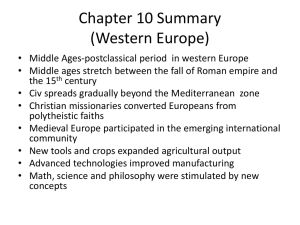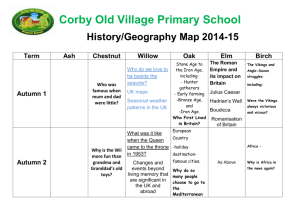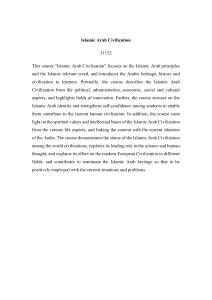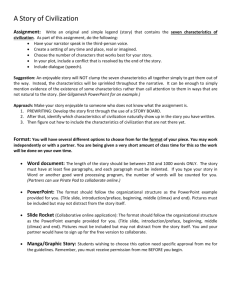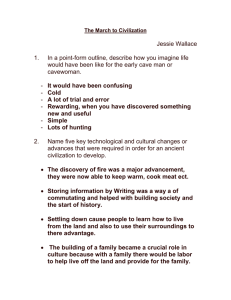1-12-15
advertisement
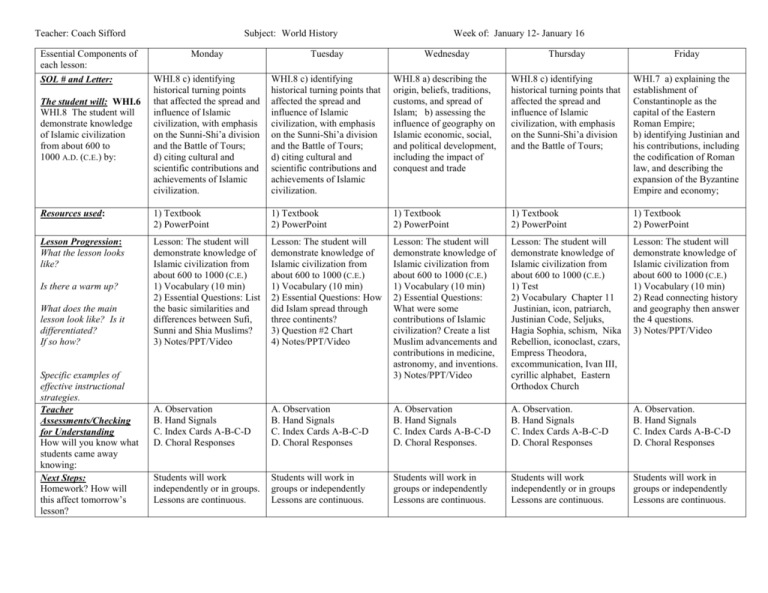
Teacher: Coach Sifford Essential Components of each lesson: SOL # and Letter: Subject: World History Week of: January 12- January 16 Monday Tuesday Wednesday Thursday Friday WHI.8 c) identifying historical turning points that affected the spread and influence of Islamic civilization, with emphasis on the Sunni-Shi’a division and the Battle of Tours; d) citing cultural and scientific contributions and achievements of Islamic civilization. WHI.8 c) identifying historical turning points that affected the spread and influence of Islamic civilization, with emphasis on the Sunni-Shi’a division and the Battle of Tours; d) citing cultural and scientific contributions and achievements of Islamic civilization. WHI.8 a) describing the origin, beliefs, traditions, customs, and spread of Islam; b) assessing the influence of geography on Islamic economic, social, and political development, including the impact of conquest and trade WHI.8 c) identifying historical turning points that affected the spread and influence of Islamic civilization, with emphasis on the Sunni-Shi’a division and the Battle of Tours; WHI.7 a) explaining the establishment of Constantinople as the capital of the Eastern Roman Empire; b) identifying Justinian and his contributions, including the codification of Roman law, and describing the expansion of the Byzantine Empire and economy; Resources used: 1) Textbook 2) PowerPoint 1) Textbook 2) PowerPoint 1) Textbook 2) PowerPoint 1) Textbook 2) PowerPoint 1) Textbook 2) PowerPoint Lesson Progression: What the lesson looks like? Lesson: The student will demonstrate knowledge of Islamic civilization from about 600 to 1000 (C.E.) 1) Vocabulary (10 min) 2) Essential Questions: List the basic similarities and differences between Sufi, Sunni and Shia Muslims? 3) Notes/PPT/Video Lesson: The student will demonstrate knowledge of Islamic civilization from about 600 to 1000 (C.E.) 1) Vocabulary (10 min) 2) Essential Questions: How did Islam spread through three continents? 3) Question #2 Chart 4) Notes/PPT/Video Lesson: The student will demonstrate knowledge of Islamic civilization from about 600 to 1000 (C.E.) 1) Vocabulary (10 min) 2) Essential Questions: What were some contributions of Islamic civilization? Create a list Muslim advancements and contributions in medicine, astronomy, and inventions. 3) Notes/PPT/Video Lesson: The student will demonstrate knowledge of Islamic civilization from about 600 to 1000 (C.E.) 1) Test 2) Vocabulary Chapter 11 Justinian, icon, patriarch, Justinian Code, Seljuks, Hagia Sophia, schism, Nika Rebellion, iconoclast, czars, Empress Theodora, excommunication, Ivan III, cyrillic alphabet, Eastern Orthodox Church Lesson: The student will demonstrate knowledge of Islamic civilization from about 600 to 1000 (C.E.) 1) Vocabulary (10 min) 2) Read connecting history and geography then answer the 4 questions. 3) Notes/PPT/Video A. Observation B. Hand Signals C. Index Cards A-B-C-D D. Choral Responses A. Observation B. Hand Signals C. Index Cards A-B-C-D D. Choral Responses A. Observation B. Hand Signals C. Index Cards A-B-C-D D. Choral Responses. A. Observation. B. Hand Signals C. Index Cards A-B-C-D D. Choral Responses A. Observation. B. Hand Signals C. Index Cards A-B-C-D D. Choral Responses Students will work independently or in groups. Lessons are continuous. Students will work in groups or independently Lessons are continuous. Students will work in groups or independently Lessons are continuous. Students will work independently or in groups Lessons are continuous. Students will work in groups or independently Lessons are continuous. The student will: WHI.6 WHI.8 The student will demonstrate knowledge of Islamic civilization from about 600 to 1000 A.D. (C.E.) by: Is there a warm up? What does the main lesson look like? Is it differentiated? If so how? Specific examples of effective instructional strategies. Teacher Assessments/Checking for Understanding How will you know what students came away knowing: Next Steps: Homework? How will this affect tomorrow’s lesson?
